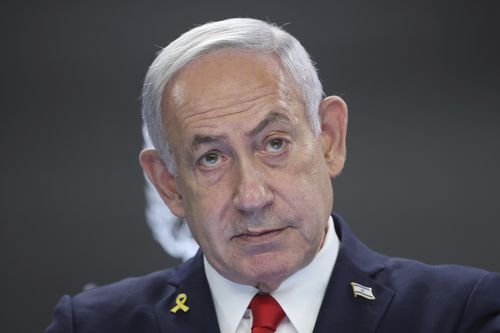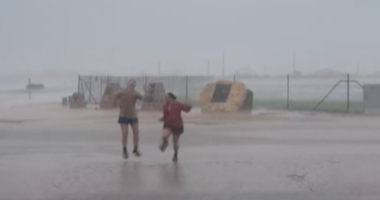Share this @internewscast.com
The wide-scale operation in Gaza City could start within days after Netanyahu grants final approval at a meeting with senior security officials.
Hamas said earlier this week that it had agreed to a ceasefire proposal from Arab mediators, which, if accepted by Israel, could forestall the offensive.

The Israeli military began calling medical officials and international organisations in the northern Gaza Strip to encourage them to evacuate to the south ahead of the expanded operation.
Israeli strikes killed at least 36 Palestinians across Gaza on Thursday, according to local hospitals.
A renewed offensive could bring even more casualties and displacement to the territory, where the war has already killed tens of thousands and where experts have warned of imminent famine.
Many Israelis fear it could also doom the remaining 20 or so living hostages taken by Hamas-led militants in the October 7, 2023 attack that ignited the war.

Gaza City operation could begin in days
During a visit to the military’s Gaza command in southern Israel, Netanyahu said he would approve the army’s plans to retake Gaza City, and had instructed officials “to begin immediate negotiations on the release of all our hostages and an end to the war on terms acceptable to Israel.”
“These two things â defeating Hamas and releasing all our hostages â go hand in hand,” he said.
The proposal would include the release of some of the hostages in exchange for Palestinians imprisoned by Israel, a pullback of Israeli forces and negotiations over a more lasting ceasefire.

Israeli troops have already begun more limited operations in the city’s Zeitoun neighbourhood and the built-up Jabaliya refugee camp, areas where they have carried out several previous major operations over the course of the war, only to see militants later regroup.
The military says it plans to operate in areas where ground troops have not yet entered and where it says Hamas still has military and governing capabilities.
So far, there has been little sign of Palestinians fleeing en masse, as they did when Israel carried out an earlier offensive in Gaza City in the opening weeks of the war. The military says it controls around 75 per cent of Gaza and residents say nowhere in the territory feels safe.

Hundreds gathered for a rare protest in Gaza City on Thursday against the war and Israel’s plans to support the mass relocation of Palestinians to other countries.
Women and children held placards reading “Save Gaza” and “Stop the war, stop the savage attack, save us”, against a backdrop of destroyed buildings as Palestinian music played. Unlike in previous protests, there were no expressions of opposition to Hamas.
“We want the war on Gaza to stop. We don’t want to migrate. Twenty-two months ⦠it’s enough. Enough death. Enough destruction,” said Bisan Ghazal, a woman displaced from Gaza City.

In Israel, families of some of the 50 hostages still being held in Gaza gathered in Tel Aviv to condemn the expanded operation. Israel believes around 20 hostages are still alive.
“Forty-two hostages were kidnapped alive and murdered in captivity due to military pressure and delay in signing a deal,” said Dalia Cusnir, whose brother-in-law, Eitan Horn, is still being held captive. Eitan’s brother, Iair Horn, was released during a ceasefire earlier this year.
“Enough to sacrifice the hostages. Enough to sacrifice the soldiers, both regular and reservists. Enough to sacrifice the evacuees. Enough to sacrifice the younger generation in the country,” said Bar Goddard, the daughter of Meni Goddard, whose body is being held by Hamas.
Additional protests are planned for Thursday night in Tel Aviv.

Plans for widening the offensive have also sparked international outrage, with many of Israel’s closest Western allies â but not the United States â calling on it to end the war.
“I must reiterate that it is vital to reach immediately a ceasefire in Gaza, and the unconditional release of all hostages to avoid the massive death and destruction that a military operation against Gaza City would inevitably cause,” United Nations chief António Guterres said at a conference in Japan.
The Gaza Health Ministry said on Thursday that at least 62,192 Palestinians have been killed in the war. Another two people have died from malnutrition-related causes, bringing the total number of such deaths to 271, including 112 children, the Health Ministry said.
The ministry is part of the Hamas-run government and staffed by medical professionals. It does not say whether those killed by Israeli fire are civilians or combatants, but it says around half are women and children. The UN and many independent experts consider its figures to be the most reliable estimate of wartime casualties. Israel disputes its toll but has not provided its own.
Hamas-led militants started the war when they attacked Israel on October 7, 2023, killing some 1200 people, mostly civilians, and abducting 251. Most of the hostages have been released in ceasefires or other deals. Hamas says it will only free the rest in exchange for a lasting ceasefire and an Israeli withdrawal.













